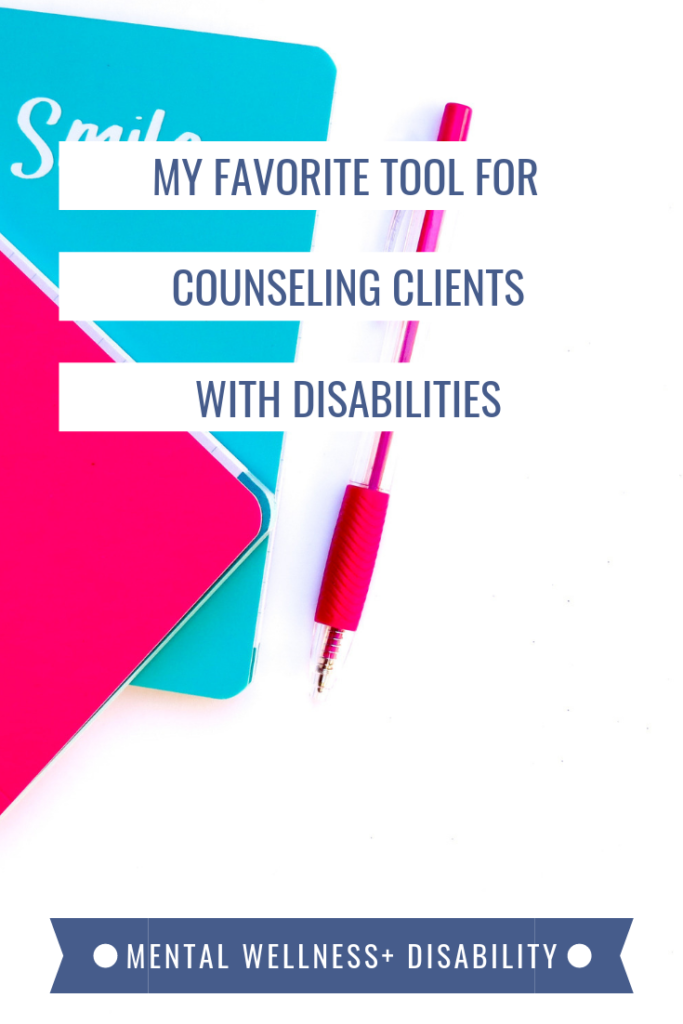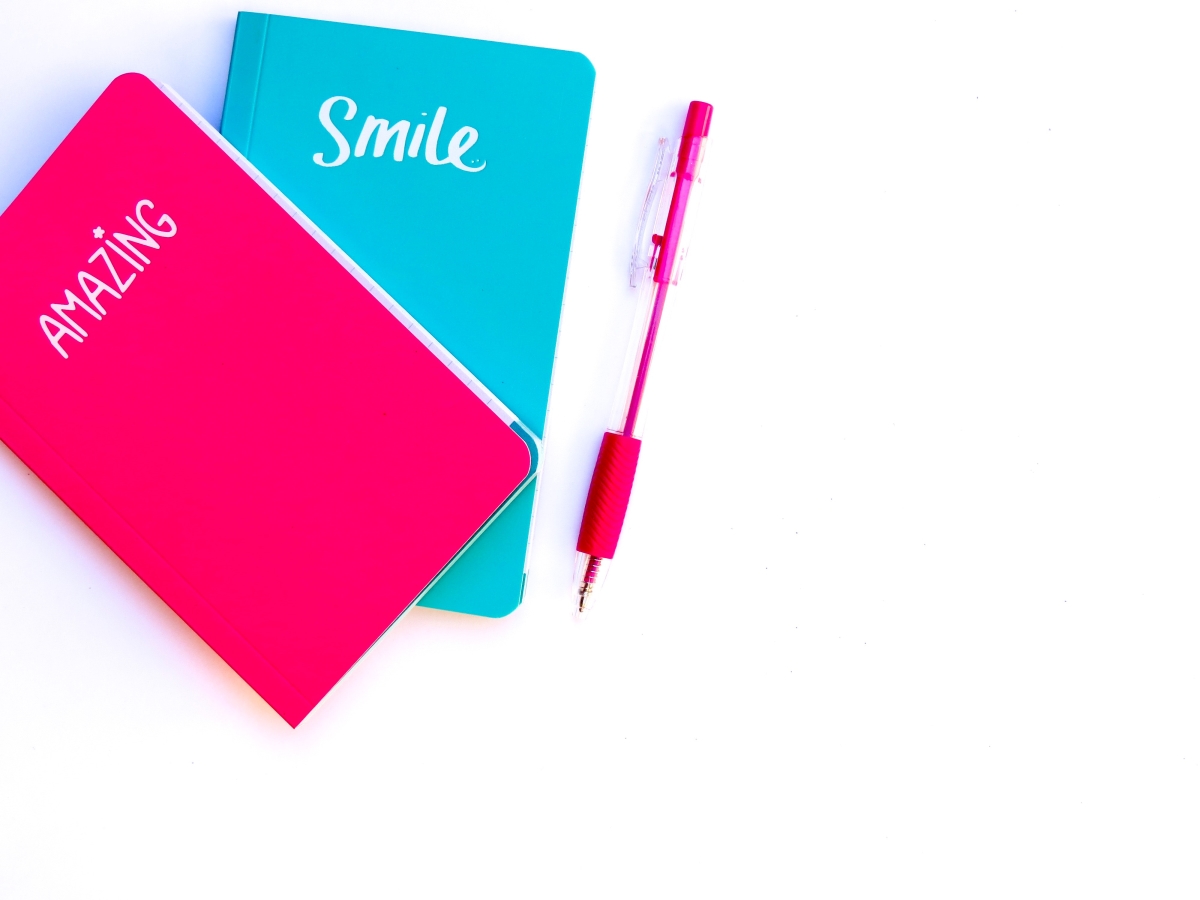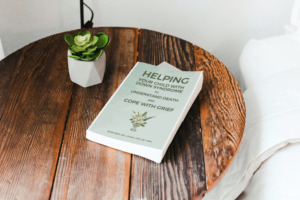Counseling adults Down syndrome, Autism, and other developmental disabilities poses some unique challenges. As a therapist, how can I be sure that my client is fully understanding everything I’m saying? How can I know that they’ll remember the homework assignment I gave them for the next week? If they do the homework, how can I, as the therapist, get a quick summary of how it went? Sessions can be devoted to discussing what comes next instead of piecing together what happened last week. Is there a tool for counseling clients with disabilities that will help me achieve all of this?
An essential tool for counseling clients with developmental disabilities
What’s a tool that can address all of those needs? If you’re imagining that it’ll be something costly or complicated, you’ll be delighted to learn that it’s neither.
It’s just a notebook!

Why a notebook is my favorite tool for counseling clients with developmental disabilities
I can’t take the credit for having stumbled upon the deceptively simple yet ultra-effective tool for counseling clients with disabilities. It was actually suggested to me a few years ago by a client. This client loved journaling, and decided to keep a separate journal to mark their progress in counseling.
I quickly saw how much more effective this made our sessions. Without delays due to recapping the past week, we were able to quickly move on to troubleshooting and role playing various techniques to address my client’s needs.
The notebook served to ground our sessions and allowed us to focus on what mattered most, not what mattered right then at the time of the session. This is a common difficulty when counseling clients with disabilities. Whether the issue is not having a strong concept of time, or having a language processing disorder, etc., many clients struggle with some of the fundamental aspects of counseling. Chief among these is the ability to recall and communicate the things that happened since the last session that are most closely related to their therapeutic goals.
I also saw the sense of pride and responsibility that my client had for their progress in attaining their therapeutic goals. My client was working hard, and had the evidence to prove it. This convinced me that it might give other clients a similar dedication to their counseling goals.
Because counseling isn’t really about what happens in the 45 minutes a week you spend with your therapist. It’s about how well you’re able to translate what you’ve learned during that time into making real, doable improvements in your daily life.
How to use a notebook as a tool for counseling clients with disabilities
Selecting a notebook
I’ve seen a wide range of how clients have used a counseling notebook.
Some have selected a very pretty and inspiring journal, while others have DIY’d themselves a collage cover to make their notebook uniquely theirs. There are plenty of clients who just hit the back to school sale and buy the least expensive composition notebook. There’s no right or wrong way to approach it. In my experience, regardless of what the notebook looks like, the end result is the same.
Using a notebook in session
The most essential things to record in a counseling notebook are:
Quick summary of session content. It might just be a few key phrases or concepts, or it might be a more detailed paragraph. Ideally, this will be written by the client. This is helpful for me, as a therapist, to confirm my client’s understanding of the key points of our discussion. By asking my client to summarize in their own words, I gain some valuable insight. I learn the language my client uses to describe and think about their problem. This helps me in future sessions to make things clear for them. If I’ve created any sort of visual during the session, my client might redraw this or even paste in my drawing.
Homework assignment for next session. This should include what the task is, how often it should be done, possible pitfalls to be aware of if there are any, any exclusions for times when homework should not be done, and how to mark progress.
For instance, homework might be:
“Use the phrase “when you _____________, I feel ____________” to communicate with another person. Do this at least once every day over the next week. This will help keep me from getting into arguments, because I’ll just be telling other people how I feel. I want to stop telling people what to do, or telling them that they are wrong. Because my relationship with mom has been bad lately, don’t use this with her, only with other people. Every day, write down what I said to who, and how it went. I can use a scale from 1-5 to mark how it went, with 1 being the worst and 5 being the best.”
Client’s follow up. Like notebook selection, this will be up to the client to determine how detailed they want to be, and how much time and effort they want to devote to this. I’ve had clients who have written pages and pages of details about their homework. Others will simply do the absolute minimum.
The therapeutic effect of using a counseling notebook for clients with disabilities
Either way is completely fine. I never tell a client that how they’ve done their follow up is wrong.
Because what happens over time is that my client sees that they are truly in charge of whether counseling is working for them.
Many clients with disabilities tell me that they have tried counseling in the past, and that it didn’t work.
Those clients usually report that they would meet with a counselor who was very nice, but that they couldn’t really remember anything they learned as a result.
By instituting a counseling notebook, my clients have a living document that reminds them of the progress they’ve made for times when they get dejected and feel that they aren’t moving forward. We can look back and reflect on how far they’ve come.
For clients who simply aren’t doing the work, the notebook is a tangible reminder that things won’t change unless they’re willing to make some changes. It’s great tool for pointing out this disparity between what they want and the work they’re doing, without it devolving into a power struggle or a case of “you said/I said.”
Most importantly, my clients maintain a sense of empowerment and autonomy in the process.
Most of my clients with disabilities tell me that they feel powerless. There will always be someone around telling them what to do and how to do it. My clients don’t have the opportunity to be spontaneous, and they usually don’t get to have ‘off’ days. They are expected to behave consistently every day, and to be constantly showing improvement.
That’s a tall order for anyone. It’s certainly not something that I could do.
Using counseling notebook communicates that, while I am there to help, I am not in charge of what happens during counseling. Therapy is their process and they get to be the hero of their own story. I’m just the guide (yes, more than one client has called me Yoda, and I’m OK with that!)
Making it work for every client
For every client who adores having a journal to write their counseling journey in, there are just as many for whom this wouldn’t be a great choice. Maybe writing is tiring for them. Perhaps they can’t read back what they’ve written, or they’re prone to losing things like notebooks. Whatever the reason, if a journal wouldn’t work, there are many alternative ways to have the same
A ‘journal’ in this case, might take a different format.
Maybe we’ll use their phone to record a voice memo summarizing the session and their homework assignment at the end of a session. Then they can listen to it as they need to throughout the week. They might even set a reminder on their phone to listen to it at a certain time of day each day. Then they can voice record their progress and setbacks as they occur throughout the week. Together, we can listen to their voice memos and reflect on what worked and what still needs work.
Some clients have even used pictures taken on their phone to accomplish the same tasks. They’ll take a picture of a worksheet or something else that reminds them of what was discussed and their homework for the week. Then they’ll take pictures throughout the week to guide our discussion of their progress.
If you think that a counseling notebook might be helpful for clients with disabilities, help me spread the word by sharing this post!
Keep reading
Other posts you may be interested in
How to Know if Someone is a Real Friend. A Quiz for Teens and Adults with IDD.
In my counseling practice, I offer mental health counseling for teens and adults with IDD. Many of my clients who have Down syndrome, Cerebral palsy, and other disabilities have lots of meaningful friendships in their lives. But sometimes, they ask “how can I know if someone is a real friend?” Maybe you have a friend […]












